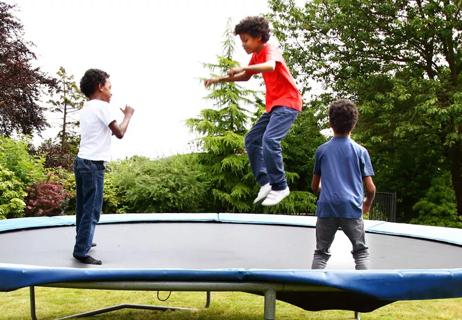Sexting has become all too common among kids, putting them at risk for bullying, blackmailing and human trafficking

In today’s digital age, it’s become much more common for children to interact with smartphones, social media and online platforms at a much earlier age than older generations who never had access to such technology. But with a universal level of access comes greater responsibility and a whole new set of risks related to stranger danger, human trafficking and sexting.
Advertisement
Cleveland Clinic is a non-profit academic medical center. Advertising on our site helps support our mission. We do not endorse non-Cleveland Clinic products or services. Policy
“Sexting” means sending sexually explicit videos, images or messages through text, direct messages and online social media platforms. It has become prevalent among youth ages 11 to 17, though children even younger than that have also been reported to participate in sexting. One in seven teens say they’ve sent sexts, while 1 in 4 say they’ve received them.
While nearly all studies agree that sexting has become part of modern-day sexual behavior, there’s a dark side, too: Nonconsensual sexting, unauthorized distribution and coercion are on the rise. For example, research shows that 14.5% of sexts are forwarded to other people without the original sender’s consent.
When sexting is coerced, or when sexts are shared without consent, it can lead to harassment by friends, cyberbullying, blackmailing, and a slew of problems related to the safety and well-being of a young person’s emotional, mental and physical health.
To help protect your kids from these risks, child psychologist Kate Eshleman, PsyD, says it’s important to talk about the dangers of sexting early and often and to find ways to support your kids as they navigate the nuances of internet safety.
Dr. Eshleman shares that the dangers of sexting revolve around three problem areas related to permanence, loss of control and legality. When you talk to your children about the risks of sexting, these talking points will help put those dangers into perspective:
Advertisement
When you post photos online or send them to other people, you always run the risk of your images and messages being intercepted, mishandled or shared without your consent. And, again, if you’re under the age of 18, these nonconsensual behaviors can have widespread legal consequences, as well as a significant impact on your mental health. All of this can impact your physical health and overall safety and well-being.
“We have to be mindful of the potential for something bad to happen and not take any unnecessary risks, and we have to help kids understand what could happen,” emphasizes Dr. Eshleman. “We often see in the media situations where young people complete suicide because of situations that occur where they’re being blackmailed or bullied or they feel like there’s no way out of a situation, and all of these things can cause significant mental health issues.”
Our mental health and physical health are very closely tied together. You can think of both areas of your life as two sides of the same coin — when one side falters, the other side reels from the effects. That’s why we talk about the importance of supporting youth mental health at the same time we talk about the physical risks associated with mental health crises.
Advertisement
“If you’re losing sleep or you’re not doing well in school or you’re not spending time with your friends and you can’t eat because of the stress that’s going on related to nonconsensual sexual behaviors or sexting, these are all going to have a significant impact on your mental and physical health,” warns Dr. Eshleman.
There’s no surefire way to make sure your kids aren’t sexting (or having sex). But as parents and caregivers, you can certainly put guardrails in place to help protect them and educate them about the risks associated with sexting — including what to do if they feel like there’s no way out of a dangerous situation.
Dr. Eshleman offers advice for concerned parents, children and teens alike on how to navigate the nuances of sexting.
“As soon as kids begin to have independent access to this technology, that’s when the conversation around sexting should begin,” advises Dr. Eshleman. Have these conversations using terms and tones that are developmentally appropriate.
For example, if you have younger children who have access to online video games, tablets, laptops or your phone, set expectations for how those devices are used and introduce the idea that they shouldn’t talk to strangers they don’t know online.
Advertisement
Maybe they can play certain games, but they’re not allowed to use the camera or take and share photos or use social media until they reach a certain age. And when it comes to using social media, put specific rules in place for what platforms they can access, and then monitor that access accordingly.
“As the child gets older, you start to discuss why those expectations are in place and what the potential dangers and risks are,” says Dr. Eshleman. “You can be a bit more explicit about sexting and sexual behaviors — not with the intent to scare, but so they can make informed decisions and be aware of those risks when they’re making their choices.”
This is all in an effort to increase your child’s understanding of the importance of consent and personal boundaries.
Making friends and establishing relationships is important for kids at any age — so, if they find themselves in a relationship where they feel comfortable with the idea of sexting, or if they come to you to discuss those curiosities, it’s important to validate their feelings while also being realistic about the risks.
One of the hardest lessons to teach a young person is the fleeting nature of relationships and the difficulty of establishing and maintaining trust. As your children age and gain experience in these areas, their understanding of those concepts will also continue to evolve.
Advertisement
“You want to validate the nature of their relationship and these feelings and help them recognize that while this is an important relationship that’s currently filled with trust, it may not always be that way,” advises Dr. Eshleman. “Acknowledge that it’s hard to think about that right now, but that it is a possibility they have to consider for the future.”
Like any conversation related to “the birds and the bees” and safe sex practices, you want to empower your child to have ownership over their body and feel safe and protected when it comes to engaging in sexual behaviors, when the time is right.
When it comes to sexting in particular, it’s important to remind them that they’re in control of the situation — up until they send the sext. But once that material is sent, it’s effectively out of their hands — and that comes with acknowledging a certain loss of control.
“We don’t know who else has access to the other person’s phone or devices,” reminds Dr. Eshleman. “Are their friends or siblings going to see what you’re sending? What about their parents? These things we send each other aren’t necessarily protected, even if the person you’re sending them to has the best intentions.
“When it comes to sexting, it’s not just about honoring the relationship you have. It’s also about being aware of all the possibilities of what could happen and who else could be involved and what all these pieces and parts are going to look like in the future.”
You should maintain open lines of communication with your child long before these tougher conversations on sexting are needed.
“You want to talk about really benign things like, ‘How was your day today? What was the best part of your day? Did anything funny happen today or did anything make you angry?’” suggests Dr. Eshleman. “You want to start that communication as often and as early as you can with benign topics so rapport and that opportunity are established so that if something difficult does come up, your kids are more willing and comfortable to come to you with more serious issues.”
Relationships are a lot of work. And when you’re young, there’s real, significant pressure to feel like you need to do or say all the “right” things to achieve a meaningful relationship. But most adults know that real, genuine intimacy takes time, and it’s about so much more than simply satisfying your partner’s needs.
Remind your children that they should never feel forced into a situation that makes them uncomfortable. Knowing how to set up healthy boundaries and protect themselves is always important. But let them know there are other ways to be intimate with someone they care about that don’t involve physical intimacy or sexual behavior.
“You can encourage them to talk on the phone, text each other and FaceTime when you’re apart,” says Dr. Eshleman. “They can send appropriate pictures with an outfit they like or share pictures of them with the family on a family vacation. It’s important to show that there are other ways to establish a bond with someone you care about that doesn’t have the related risks associated with sexting.”
Make it clear to your child that they can always come to you for help or seek out other trusted adults for help in any situation that involves sex, sexting and nonconsensual behaviors. Knowing they’re never alone when faced with these situations is crucial to their health and safety.
This way, if something goes wrong or your child finds themselves in a situation where they feel uncomfortable or unsafe, they’ll know that you have their back — no matter what.
“What we really want to emphasize is that it’s always OK to ask for help,” says Dr. Eshleman. “Find a trusted adult to speak to. Maybe it’s your parents, maybe it’s your pediatrician, or your coach or a friend’s parent. But you want to find a trusted adult to share this with and get help navigating it.”
The same goes for parents who are dealing with these issues for the first time and are concerned about their children.
“We don’t expect the kids or the parents to have all the answers,” Dr. Eshleman continues. “So, you can call your pediatrician, call somebody from the school, call somebody from the police station. People aren’t expected to navigate this alone. And while it may be difficult, it’s better than letting it continue and/or escalate.”
At the end of the day, you likely know your kid better than most. If you educate them early about the dangers of sexting, reinforce positive behaviors and healthy boundaries, and keep lines of communication open between you and your child, you can help reduce the risks of sexting — and strengthen your child’s safety and sense of self along the way.

Sign up for our Health Essentials emails for expert guidance on nutrition, fitness, sleep, skin care and more.
Learn more about our editorial process.
Advertisement

It’s not just about people you don’t know — it’s about behaviors that don’t feel right.

It’s never too early to teach your kids who strangers are and how to avoid unsafe situations

Talk with your kids about online risks, and consider monitoring their activity

Many cosmetic products can cause poisoning and chemical burns

Consider other outdoor activities

When baby teeth get damaged, these procedures can relieve pain and save space for adult teeth

Most kids start losing baby teeth around age 6 — but there’s some wiggle room in the timeline

Being hooked on love can cause unhealthy relationship patterns and obsessive thoughts

The tropical fruit is a good source of antioxidants and vitamin C

Most people fall asleep within 10 to 20 minutes, but if your experience is different, adjusting your sleep schedule may help

Exploring your hidden side can lead to better understanding of what makes you tick